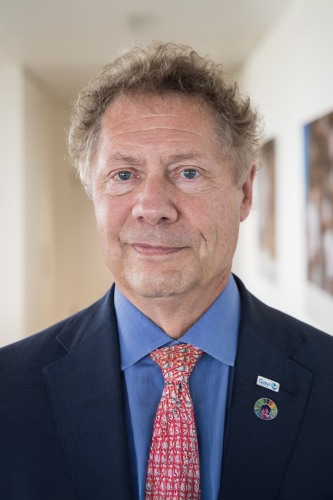---

Seth Berkley, M.D.
Biography
A serial entrepreneur and pioneer in global public health for more than 35 years, Dr. Berkley has been a champion of equitable access to vaccines and of innovation, and a driving force to improve the way the world prevents and responds to infectious disease. From 2011 to 2023 Berkley served as CEO of Gavi, the Vaccine Alliance. During his tenure at Gavi, Berkley led a team that worked toward broadening global immunization access, resulting in more than half of the world’s children being vaccinated annually. His leadership was equally significant in co-founding and spearheading COVAX, an initiative that facilitated the distribution of over 2 billion COVID-19 vaccine doses to 146 nations.
As a senior advisor to the Pandemic Center, Dr. Berkley joins an interdisciplinary team that takes a holistic approach to pandemic preparedness. His global health leadership experience will bolster the Center’s efforts to build resilience to biological threats around the world and help mitigate their impact.
Recent News
---
FDA refuses review of mRNA flu vaccine; move could chill other research, doctor says
---
Seth Berkley, MD, is an infectious disease epidemiologist currently advising vaccine, biotechnology, and technology companies, and is Adjunct Professor and Senior Adviser to the Pandemic Center at Brown University. He co-founded COVAX, a global vaccine initiative; and founded and served as CEO of the International AIDS Vaccine Initiative.COVID-19 offered a difficult lesson about the devastation a virus can bring to our world. In his latest book, Fair Doses: An Insider's Story of the Pandemic and the Global Fight for Vaccine Equity, Dr. Seth Berkley provides us the fascinating backstory of vaccines: how they came about, why they’re important, and how they have been made globally available. But our quest for vaccine equity remains ongoing. Dr. Berkley, an internationally-recognized infectious disease epidemiologist, offers an insider’s view of the challenges of developing and disseminating vaccines for a broad swath of illnesses, from Ebola to AIDS to malaria and beyond.
Seth Berkley, MD, is an infectious disease epidemiologist currently advising vaccine, biotechnology, and technology companies, and is Adjunct Professor and Senior Adviser to the Pandemic Center at Brown University. He co-founded COVAX, a global vaccine initiative; and founded and served as CEO of the International AIDS Vaccine Initiative.
Under his leadership, Gavi was the largest vaccine organization in the world, raising $20 billion in funding, delivering 7 billion vaccine doses, and immunizing 3 billion children, transforming global access and reshaping the vaccine market for low-income countries. Dr. Berkley explains why vaccine mistrust has persisted for centuries, and why today’s misinformation environment is uniquely dangerous. He details how Gavi’s alliance model mobilized WHO, UNICEF, governments, and manufacturers to build the largest vaccine delivery network in history. We also go inside COVAX, from vaccine nationalism to the supply-chain barriers that defined the global COVID-19 response. Finally, Dr. Berkley looks ahead to how mRNA, synthetic biology, and AI could radically accelerate our ability to respond to the pandemics to come.
Magical thinking will not prevent future pandemics or improve public health
Dr. Berkley spoke to Infectious Disease Special Edition about his new book, “Fair Doses: An Insider’s Story of the Pandemic and the Global Fight for Vaccine Equity.”
---